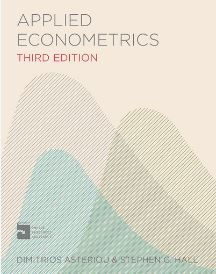ARIMA models and the Box Jenkins methodology
A Chapter in the book Applied Econometrics. The purpose of this paper is to study the Box-Jenkins methodology to ARIMA models and determine the reasons why in empirical tests it is found that the post-sample forecasting
accuracy of such models is worse than much simpler time series methods. It is concluded that the major problem is the way of making the series stationary in its mean (i.e., the method of
differencing) that has been proposed by Box and Jenkins. If alternative approaches are utilized to remove and extrapolate the trend in the data, ARMA models outperform the corresponding methods involved in the great majority of cases. In addition it is shown that using ARMA models to seasonally adjusted data slightly improves post-sample accuracies while simplifying the use of ARMA models. It is also confirmed that transformations slightly improve post-sample forecasting accuracy, particularly for long forecasting horizons. Finally,
it is demonstrated that AR(1) and AR(2), or their combination, produce as accurate postsample results as those found through the application of the Box-Jenkins methodology.
Website:
https://he.palgrave.com/page/detail/Applied-Econometrics/?K=9781137415479
Simple
- Date (Creation)
- 2015-10-01
- Date (Publication)
- 2015-10-01
- Date (Revision)
- Edition
-
third
- Citation identifier
-
https://www.mica-project.eu/
/
MICA_B2-13
MICA WP3 2017-09-25T10:33:00 Record extracted from Batch 2 spreadsheet
- Other citation details
-
No additional information provided about the dataset
- Purpose
-
Purpose for data generation is not known
- Status
- Completed
- Point of contact
-
Organisation name Individual name Electronic mail address Role Hellenic Open University
Resource provider
- Maintenance and update frequency
- Unknown
- dataCentre
-
-
MICA
-
-
MICA ontology (TemporalScheme)
-
-
undefined
-
-
MICA ontology (DataScheme)
-
-
General descriptive information / Report / Other (Report)
-
- Keywords
-
-
Requirement for data generation: Voluntary
-
- Keywords
-
-
Method of data or information generation: Academic research
-
-
GEMET Concepts
-
-
Other economic activities
-
-
GEMET Concepts
-
-
Society
-
-
MICA ontology (DomainScheme)
-
-
Consumption
-
-
MICA ontology (DomainScheme)
-
-
Investors
-
-
MICA ontology (DomainScheme)
-
-
EU industry sectors (Supply)
-
-
MICA ontology (DomainScheme)
-
-
Primary raw materials (Production)
-
-
MICA ontology (DomainScheme)
-
-
CN codes
-
- Access constraints
- Other restrictions
- Use constraints
- Other restrictions
- Language
- English
- Topic category
-
- Geoscientific information
- Economy
- Hierarchy level
- Non geographic dataset
- Other
-
Individual item (e.g. a one-off academic paper or single website)
Conformance result
- Title
-
Data uncertainty
- Date
- Explanation
-
Are any uncertainty measures provided (e.g. standard errors, confidence intervals, etc.)?
- Pass
- Yes
Conformance result
- Title
-
Quality assurance procedures
- Date
- Explanation
-
Are quality assurance procedures described?
- Pass
- Yes
Conformance result
- Title
-
Information generation methods
- Date
- Explanation
-
Are data or information generation methods formally described?
- Pass
- Yes
Conformance result
- Title
-
Record review
- Date
- Other citation details
-
Reviewed by: British Geological Survey
- Explanation
-
Record validation
- Pass
- No
Conformance result
- Statement
-
Organisation source implies that information should be of good quality
Metadata
- File identifier
- 9433fafa-cb55-4519-8113-d872f051ed65 XML
- Metadata language
- English
- Character set
- MD_CharacterSetCode_utf8
- Hierarchy level
- Non geographic dataset
- Date stamp
- 2024-11-07
- Metadata standard name
-
ISO19115
- Metadata standard version
-
2003/Cor.1:2006
- Metadata author
-
Organisation name Individual name Electronic mail address Role British Geological Survey
Point of contact
 BGS Hosted Metadata
BGS Hosted Metadata

